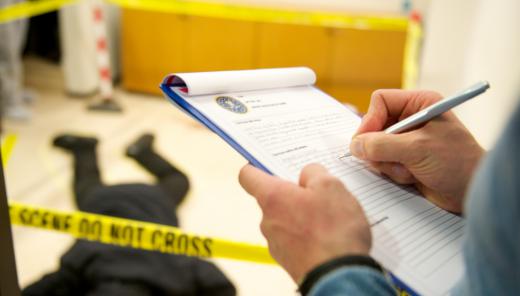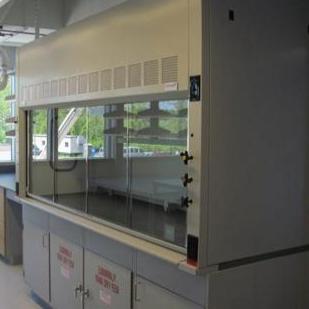What is a Biochemistry Lab?
 Mary McMahon
Mary McMahon
A biochemistry lab is a facility in which people can perform tasks related to the study of biochemistry. Biochemistry labs have equipment which can be used to explore various topics in biochemistry, along with space for storage of specimens, experiments, and other activities. Such labs can be found in colleges and universities with biochemistry departments, along with institutions which perform biochemistry research, and as standalone structures which perform research and analysis. Basic facilities for biochemistry can also be found in some criminal laboratories, as many topics in biochemistry are useful in the analysis and evaluation of evidence.
Biochemistry is a science which involves the examination of various chemical processes as they are found in living organisms. These can range from the processes involved in cell division to the signals sent by neurons to coordinate the workings of the nervous system. Many tasks in biochemistry have to take place in a laboratory environment with special equipment, because there is no other way to study biochemical processes which take place on the cellular or even molecular level.

A typical biochemistry lab includes workbenches for people to use, with equipment like spectrometers, microscopes, DNA sequencers, imagers, chromatographs, computers, and electrophoresis equipment, along with tools which can be used to manipulate samples. The lab also has protections such as fume hoods and isolation boxes to protect people from hazardous substances, along with storage space and specially equipped facilities like cold rooms and negative pressure rooms. The biochemistry lab may be attached to offices used by scientists affiliated with the lab.

At colleges and universities, a biochemistry lab can be used for instruction, with students being obliged to spend time in the lab working on projects and developing hands-on experience. College labs can also be used for research by graduate students and advanced undergraduates. Scientific institutions maintain labs for research and analysis of samples, from suspect viruses involved in an epidemic to new species of plants.

Some biochemistry labs focus on analysis of materials by request, handling materials such as samples from patients with medical problems, evidence from crime scenes, or DNA samples which need to be processed. These labs charge fees for handling such materials and generating reports. They may serve a large area, handling materials from a variety of sources, or they may only offer their services to specific companies and individuals. This type of biochemistry lab may have additional concerns such as security of evidence and patient privacy which must be addressed with lab protocols.
AS FEATURED ON:
AS FEATURED ON:














Discussion Comments
What are the most used pieces of equipment in these laboratories?
How can a biochemist do his Msc on biofuel?
@Istria- I have taken one online science course with laboratory, and I decided that I would not do it again, at least not the laboratory requirement. The lecture portion was fine if you have a basic grasp of the science before enrolling, but it is not great for those who are behind the curve in the science they are studying (it is hard to ask a question and receive a timely answer).
The laboratory segment, on the other hand, was horrible. It was too easy, and did not require that I learn proper laboratory procedure. There are no consequences for mistakes, which does not train you to be responsible should your work ever require you work in a real laboratory. I took geology, but I would assume in an advanced science like biochemistry, that a virtual biochemistry laboratory is no substitute for the real thing.
What are people's thoughts on virtual biochemistry labs, or virtual science labs of any sort? I know that computer technology has advanced in leaps and bounds over the decades, but is the quality of research done in a virtual lab as good as that done in a physical lab?
I have the option to sign up for an online biochemistry course for the fall semester, but I do not know if it will prepare me as well as being on campus. I have never taken an online science course before so I do not know what to expect.
@alchemy- Human and medicinal biochemistry is only one area of study in the field of biochemistry. There are numerous different subjects to study within biochemistry. For example, a biochemistry master’s student may focus her studies on plant biochemistry while another may focus his studies on biochemistry in relation to biofuels and energy. Still others yet may focus on general biochemistry, which focuses on both plant and animal cellular interactions. In your case, you may be interested in studying biochemistry in relation to different cycles within an ecosystem, like carbon, nitrogen, or phosphorous cycles.
The main reason that there are so many programs geared towards human and medicinal biochemistry is due to the aging population of the industrialized world and the size of the population in general. Biochemists are in high demand in this segment of the field because of the sheer growth in the population and the increase in the population that will benefit from biochemical research.
Does biochemistry also deal with human biology, or do researchers study different biochemical processes and reactions? I always see advertisements for biochemistry programs, but they are all related to health care. Why is this so? I find both biology and chemistry interesting, but I would not want to study it if the only jobs are in the medical field. I think that medicine is important, but I am more interested in ecology than human biology.
Post your comments